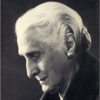FRIENDSHIP. A mutual belief in the same fallacies, mountebanks, hobgoblins and imbecilities.
H. L. Mencken (1880-1956) American writer and journalist [Henry Lewis Mencken]
A Book of Burlesques, “The Jazz Webster” (1924)
(Source)
Variant:
Friendship is a common belief in the same fallacies, mountebanks and hobgoblins.
[Chrestomathy, ch. 30 "Sententiae" (1949)]
Quotations about:
friendship
Note not all quotations have been tagged, so Search may find additional quotes on this topic.
We should be more ashamed to distrust our friends than to be deceived by them.
[Il est plus honteux de se défier de ses amis que d’en être trompé.]François VI, duc de La Rochefoucauld (1613-1680) French epigrammatist, memoirist, noble
Réflexions ou sentences et maximes morales [Reflections; or Sentences and Moral Maxims], ¶84 (1665-1678) [tr. Heard (1917)]
(Source)
First appeared in the second (1666) edition. Compare to Maxim 86, also from that edition: "Our distrust justifies the deception of others [Notre défiance justifie la tromperie d’autrui.]"
(Source (French)). Alternate translations:
It is much less for a Man's Honour to distrust his Friends, than to be deceived by them.
[tr. Stanhope (1694), ¶85]
It is more dishonourable to distrust a friend, than to be deceived by him.
[pub. Donaldson (1783), ¶171; ed. Lepoittevin-Lacroix (1797), ¶81; ed. Carvill (1835), ¶151]
It is more disgraceful to distrust; one's friends than to be deceived by them.
[ed. Gowens (1851), ¶87]
It is more disgraceful to distrust than to be deceived by our friends.
[tr. Bund/Friswell (1871), ¶84]
It is more disgraceful to mistrust one's friends than to be the victim of their treachery.
[tr. Stevens (1939), ¶84]
It is more shameful to distrust one's friends than to be deceived by them.
[tr. FitzGibbon (1957), ¶84; tr. Tancock (1959), ¶84]
It is more shameful to distrust our friends than to be deceived by them.
[tr. Kronenberger (1959), ¶84; tr. Whichello (2016), ¶84]
The truly conscientious will not limit themselves to helping with the more exciting parts of one’s life. They are also scrupulous about offering helpful suggestions regarding such mundane matters as your household arrangements, work habits, mannerisms, and use of the language. There is nothing like a good friend to help you out when you are not in trouble.
Judith Martin (b. 1938) American author, journalist, etiquette expert [a.k.a. Miss Manners]
Miss Manners’ Guide for the Turn-of-the-Millennium, Part 1 “Revised Conventions,” “Advice” (1989)
(Source)
The best mirrour is an old friend.
George Herbert (1593-1633) Welsh priest, orator, poet.
Jacula Prudentum, or Outlandish Proverbs, Sentences, &c. (compiler), # 296 (1640 ed.)
(Source)
Few vices are more certain to prevent you from having lots of friends than possessing too many virtues.
[Il y a peu de vices qui empêchent un homme d’avoir beaucoup d’amis, autant que peuvent le faire de trop grandes qualités.]Nicolas Chamfort (1741-1794) French writer, epigrammist (b. Nicolas-Sébastien Roch)
Products of Perfected Civilization [Produits de la Civilisation Perfectionée], Part 1 “Maxims and Thoughts [Maximes et Pensées],” ch. 2, ¶ 110 (1795) [tr. Parmée (2003), ¶ 90]
(Source)
(Source (French)). Alternate translations:
There are few vices that prevent a man from having many friends so much as his too high qualities prevent him.
[tr. Hutchinson (1902), "The Cynic's Breviary"]
There are few vices as likely to diminish the number of a man's friends, as can an excessive possession of fine qualities.
[tr. Mathers (1926), ¶ 90]
There are few vices that will so readily prevent a man from having many friends as will the possession of inordinate talents or virtues.
[tr. Merwin (1969)]
Few vices can prevent a man from having as many friends as too great of qualities can.
[tr. Siniscalchi (1994), ¶ 110]
Each friend represents a world in us, a world possibly not born until they arrive, and it is only by this meeting that a new world is born.
So Life’s year begins and closes;
Days, though short’ning, still can shine;
What though youth gave love and roses,
Age still leaves us friends and wine.
Sometimes, with luck, we find the kind of true friend, male or female, that appears only two or three times in a lucky lifetime, one that will winter us and summer us, grieve, rejoice, and travel with us.
Barbara Holland (1933-2010) American author
One’s Company: Reflections on Living Alone, ch. 3 “Friends” (1992)
(Source)
Candour’s the cement of friendship.
F. Anstey (1856-1934) English novelist and journalist (pseud. of Thomas Anstey Guthrie)
The Brass Bottle, ch. 1 “Horace Ventimore Receives a Commission” [Ventimore] (1900)
(Source)
Originally published in The Strand Magazine (1900-02).
Love should be the vestal fire of some mighty temple — some vast dim fane whose organ music is the rolling of the spheres. Affection will burn cheerily when the white flame of love is flickered out. Affection is a fire that can be fed from day to day, and be piled up ever higher as the winter years draw nigh. Old men and women can sit by it with their thin hands clasped, the little children can nestle down in front, the friend and neighbour has his welcome corner by its side, and even shaggy Fido and sleek Titty can toast their noses at the bars.
Let us heap the coals of kindness upon that fire. Throw on your pleasant words, your gentle pressures of the hand, your thoughtful and unselfish deeds. Fan it with good humour, patience, and forbearance. You can let the wind blow and the rain fall unheeded then, for your hearth will be warm and bright, and the faces round it will make sunshine in spite of the clouds without.Jerome K. Jerome (1859-1927) English writer, humorist [Jerome Klapka Jerome]
Idle Thoughts of an Idle Fellow, “On Being in Love” (1886)
(Source)
But we are so blind to our own shortcomings, so wide awake to those of others. Everything that happens to us is always the other person’s fault. Angelina would have gone on loving Edwin forever and ever and ever if only Edwin had not grown so strange and different. Edwin would have adored Angelina through eternity if Angelina had only remained the same as when he first adored her.
It is a cheerless hour for you both when the lamp of love has gone out and the fire of affection is not yet lit, and you have to grope about in the cold, raw dawn of life to kindle it. God grant it catches light before the day is too far spent. Many sit shivering by the dead coals till night come.Jerome K. Jerome (1859-1927) English writer, humorist [Jerome Klapka Jerome]
Idle Thoughts of an Idle Fellow, “On Being In Love” (1886)
(Source)
BEATRICE: He wears his faith but
as the fashion of his hat; it ever changes with the
next block.William Shakespeare (1564-1616) English dramatist and poet
Much Ado About Nothing, Act 1, sc. 1, l. 73ff (1.1.73-75) (1598)
(Source)
What a wretched lot of old shriveled creatures we shall be by-and-by. Never mind, — the uglier we get in the eyes of others, the lovelier we shall be to each other; that has always been my firm faith about friendship, and now it is in a slight degree my experience.
George Eliot (1819-1880) English novelist [pseud. of Mary Ann Evans]
Letter to Sara Hennell (1852-05-27)
(Source)
I hope you will have a wonderful year, that you’ll dream dangerously and outrageously, that you’ll make something that didn’t exist before you made it, that you will be loved and that you will be liked, and that you will have people to love and to like in return. And, most importantly (because I think there should be more kindness and more wisdom in the world right now), that you will, when you need to be, be wise, and that you will always be kind.
Neil Gaiman (b. 1960) British author, screenwriter, fabulist
Blog entry (2008-12-31), “Another Year”
(Source)
“Pooh, promise you won’t forget about me, ever. Not even when I’m a hundred.”
Pooh thought for a little.
“How old shall I be then?”
“Ninety-nine.”
Pooh nodded.
“I promise,” he said.A. A. Milne (1882-1956) English poet and playwright [Alan Alexander Milne]
The House at Pooh Corner, ch. 10 [Christopher Robin and Pooh] (1928)
(Source)
Possibly the inspiration of the spurious Pooh quotation:
If you live to be a hundred, I want to live to be a hundred minus one day, so I never have to live without you.
For more discussion about this and related quotes, see May You All Live Forever. May I Live Forever Less A Day – Quote Investigator®.
Sex is a conversation carried out by other means. If you get on well out of bed, half the problems of bed are solved.
Peter Ustinov (1921-2004) English actor, author, director
Interview by Wendy Leigh, Speaking Frankly (1978)
See Von Clausewitz.
Land, gold, and trifles many give or lend,
But he that stoops in fame is a rare friend.[Aurum et opes et rura frequens donabit amicus:
Qui velit ingenio cedere, rarus erit.]Martial (AD c.39-c.103) Spanish Roman poet, satirist, epigrammatist [Marcus Valerius Martialis]
Epigrams [Epigrammata], Book 8, epigram 18 (8.18.9-10) (AD 94) [tr. Taylor (1657)]
(Source)
To a friend whom Martial considered as good or better an writer, who in turn publicly lauded Martial as the superior.
"To Cirinius." (Source (Latin)). Alternate translations:
Friends oft to friends in other points submit;
Few yield the glory of the field in wit.
[tr. Hay (1755)]
A friend will oft bestow gold, goods, or ground:
But who his wit will yield, is rarely found.
[tr. Elphinston (1782); Book 2, ep. 103]
It is not uncommon for one friend to bestow on another good and land, but to make concessions of literary pre-eminence is a rare proof of friendship.
[tr. Amos (1858)]
Gold, and wealth, and estates, many a friend will bestow; one who consents to yield the palm in genius, is rare.
[tr. Bohn's Classical (1859)]
Gold and possessions and lands many a friend will bestow: he who is willing to yield in genius will be rare.
[tr. Ker (1919)]
Full many a friend will give you wealth and fields;
But rare is he who thus in genius yields.
[tr. Pott & Wright (1921)]
Gold, wealth, estates will many a man resign
To save a friend, but few the bay divine.
[tr. Francis & Tatum (1924), #400]
Many a friend will give gold and riches and land, but one prepared to yield in talent will be found but seldom.
[tr. Shackleton Bailey (1993)]
Some friends will give up goods or yield their gold.
But few will let their own worth go untold.
[tr. Wills (2007)]
A friend will often give gold, wealth, and ground:
one who will yield in talent's rarely found.
[tr. McLean (2014)]
Friendship is Love without his wings!
George Gordon, Lord Byron (1788-1824) English poet
“L’Amitié est l’Amour sans Ailes” (1806-12-29, publ. 1832)
(Source)
This phrase (which is the translation of the title), or variants of it, are the final line to each stanza of the poem.
Sometimes paraphrased "Friendship is Love without wings."
Don’t flatter yourselves that friendship authorizes you to say disagreeable things to your intimates. On the contrary, the nearer you come into relation with a person, the more necessary do tact and courtesy become.
As my father used to say: “There are two sure ways to lose a friend, one is to borrow, the other to lend.”
Patrick Rothfuss (b. 1973) American author
The Name of the Wind, ch. 49 “The Nature of Wild Things” (2007)
(Source)
One sure way to lose another woman’s friendship is to try to improve her flower arrangements.
Marcelene Cox (1900-1998) American writer, columnist, aphorist
“Ask Any Woman” column, Ladies’ Home Journal (1948-02)
(Source)
This was a regularly revisited aphorism for Cox:
One sure way to lose another woman's friendship is to try to improve her husband.
(1955-12)
The quickest way to lose another woman's friendship is to endeavor to improve her husband, her children, or her flower arrangements.
(1959-05)
One sure way to lose another woman's friendship is to try to improve either her children or her flower arrangements.
(1961-07)
Depend upon it, you see but half. You see the evil [of matrimony], but you do not see the consolation. There will be little rubs and disappointments everywhere, and we are all apt to expect too much; but then, if one scheme of happiness fails, human nature turns to another; if the first calculation is wrong, we make a second better: we find comfort somewhere — and those evil-minded observers, dearest Mary, who make much of a little, are more taken in and deceived than the parties themselves.
Jane Austen (1775-1817) English author
Mansfield Park, ch. 5 [Henry Crawford to Mary] (1814)
(Source)
But if nature does not ratify law, then all the virtues may lose their sway. For what becomes of generosity, patriotism, or friendship? Where will the desire of benefitting our neighbours, or the gratitude that acknowledges kindness, be able to exist at all? For all these virtues proceed from our natural inclination to love mankind.
[Atqui si natura confirmatura ius non erit, uirtutes omnes tollantur. Vbi enim liberalitas, ubi patriae caritas, ubi pietas, ubi aut bene merendi de altero aut referendae gratiae uoluntas poterit existere? Nam haec nascuntur ex eo quod natura propensi sumus ad diligendos homines, quod fundamentum iuris est.]
Marcus Tullius Cicero (106-43 BC) Roman orator, statesman, philosopher
De Legibus [On the Laws], Book 1, ch. 15 / sec. 43 (1.15/1.43) [Marcus] (c. 51 BC) [tr. Barham/Yonge (1878)]
(Source)
(Source (Latin)). Alternate translations:
If nature does not ratify law, all the virtues lose their sway. What becomes of generosity, patriotism, or friendship? Where should we find the desire of benefitting our neighbours, or the gratitude that acknowledges kindness? For all these virtues proceed from our natural inclination to love and cherish our associates.
[tr. Barham (1842)]
And if Nature is not to be considered the foundation of Justice, that will mean the destruction [of the virtues on which human society depends]. For where then will there be a place for generosity, or love of country, or loyalty, or the inclination to be of service to others, or to show gratitude for favours received? For these virtues originate in our natural inclination to love our fellow-men, and this is the foundation of Justice.
[tr. Keyes (1928)]
That is why every virtue is abolished if nature is not going to support justice. What room will there be for liberality, patriotism, and devotion; or for the wish to serve others or to show gratitude? These virtues are rooted in the fact that we are inclined by nature to have a regard for others; and that is the basis of justice.
[tr. Rudd (1998)]
If nature will not confirm justice, all the virtues will be eliminated. Where will there be a place for liberality, for love of country, for piety, for the desire to do well by others or return kindness? These all arise because we are inclined by nature to love other humans, and that is the foundation of justice.
[tr. Zetzel (1999)]
And if right has not been confirmed by nature, they may be eliminated. In fact, where will liberality be able to exist, where affection for the fatherland, where piety, where the will either to deserve well of another or to or to return a service? These things originate in this, that we are inclined by nature to to cherish human beings; that is the foundation of right.
[tr. Fott (2013)]
Two persons will not be friends long if they are not inclined to pardon each otherʼs little failings.
[L’on ne peut aller loin dans l’amitié, si l’on n’est pas disposé à se pardonner les uns aux autres les petits défauts.]
Jean de La Bruyère (1645-1696) French essayist, moralist
The Characters [Les Caractères], ch. 5 “Of Society and Conversation [De la Société et de la Conversation],” § 62 (5.62) (1688) [tr. Van Laun (1885)]
(Source)
(Source (French)). Alternate translations:
Two persons will not be friends a long time, if they can't forgive each other little failings.
[Bullord ed. (1696)]
Two Persons will not be long Friends, if they can't forgive each other little Failings.
[Curll ed. (1713)]
You will never go far in friendship unless you are ready to forgive each other's petty faults.
[tr. Stewart (1970)]
The delight of social relations between friends is fostered by a shared attitude to life, together with certain differences of opinion on intellectual matters, through which either one is confirmed in one’s own views, or else one gains practice and instruction through argument.
[Le plaisir de la société entre les amis se cultive par une ressemblance de goût sur ce qui regarde les moeurs, et par quelques différences d’opinions sur les sciences: par là ou l’on s’affermit dans ses sentiments, ou l’on s’exerce et l’on s’instruit par la dispute.]
Jean de La Bruyère (1645-1696) French essayist, moralist
The Characters [Les Caractères], ch. 5 “Of Society and Conversation [De la Société et de la Conversation],” § 61 (5.61) (1688) [tr. Stewart (1970)]
(Source)
(Source (French)). Alternate translations:
The pleasure of Society amongst Friends is cultivated by a likeness of Inclinations, as to Manners; and a difference in Opinion, as to Sciences: the one confirms and humours us in our sentiments; the other exercises and instructs us by disputation.
[Bullord ed. (1696)]
The Pleasure of Society amongst Friends, is cultivated by a likeness of Inclinations, as to Manners, and by some difference in Opinion, as to Sciences: The one confirms us in our Sentiments, the other exercises and instructs us by Disputation.
[Curll ed. (1713)]
The pleasure of social intercourse amongst friends is kept up by a similarity of morals and manners, and by slender differences in opinion about science; this confirms us in our sentiments, exercises our faculties or instructs us through arguments.
[tr. Van Laun (1885)]
The job of a friend is not to decide what should be done, not to run interference or pick up the slack. The job of a friend is to understand, and to supply energy and hope, and in doing so to keep those they value on their feet a little longer, so that they can fight another round and grow strong in themselves.
Merle Shain (1935-1989) Canadian journalist and author
When Lovers Are Friends, ch. 9 (1980)
(Source)
The people people have for friends
Your common sense appall,
But the people people marry
Are the queerest folk of all.Charlotte Perkins Gilman (1860-1935) American sociologist, writer, reformer, feminist
“Queer People”
(Source)
Friendship is the gift that goes on giving and is a gift to both the person given to and to the giver as well. But to really make it work, it isn’t enough to give to another person. You also have to let them give to you.
Good marriages seem to function something like a buddy system — the people in them swim in their own waters but keep a protective eye on each other, and should the whistle blow, turn up quickly to hold each other’s hand.
But a man’s best friend is the one who not only wishes him well but wishes it for his own sake (even though nobody will ever know it).
[φίλος δὲ μάλιστα ὁ βουλόμενος ᾧ βούλεται τἀγαθὰ ἐκείνου ἕνεκα, καὶ εἰ μηδεὶς εἴσεται]
Aristotle (384-322 BC) Greek philosopher
Nicomachean Ethics [Ἠθικὰ Νικομάχεια], Book 9, ch. 8 (9.8, 1168b.1) (c. 325 BC) [tr. Thomson/Tredennick (1976)]
(Source)
(Source (Greek)). Alternate translations:
He is most a friend who wishes good to him to whom he wishes it for that man’s sake even though no one knows.
[tr. Chase (1847)]
A man's best friend is he who wishes him well for his own sake, without caring whether others are aware of his affection.
[tr. Williams (1869)]
The best friend is he who, when he wishes the good of another, wishes it for the other's sake, and wishes it even if nobody will know his wish.
[tr. Welldon (1892)]
He is most truly a friend who, in wishing well to another, wishes well to him for his (the other’s) sake, and even though no one should ever know.
[tr. Peters (1893)]
Man's best friend is one who wishes well to the object of his wish for his sake, even if no one is to know of it.
[tr. Ross (1908)]
The best friend is he that, when he wishes a person's good, wishes it for that person's own sake, even though nobody will ever know of it.
[tr. Rackham (1934)]
The one who is most a friend is the one who wishes good things to the person he wishes them to for that person's sake, even if no one will know.
[tr. Reeve (1948)]
A best friend is one who wishes the good of another for that other's sake, even if no one is to know this.
[tr. Apostle (1975)]
My best friend is the man who in wishing me well wishes it for my sake.
Next would seem properly to follow a dissertation on Friendship: because, in the first place, it is either itself a virtue or connected with virtue; and next it is a thing most necessary for life, since no one would choose to live without friends though he should have all the other good things in the world.
[μετὰ δὲ ταῦτα περὶ φιλίας ἕποιτ᾽ ἂν διελθεῖν: ἔστι γὰρ ἀρετή τις ἢ μετ᾽ ἀρετῆς, ἔτι δ᾽ ἀναγκαιότατον εἰς τὸν βίον. ἄνευ γὰρ φίλων οὐδεὶς ἕλοιτ᾽ ἂν ζῆν, ἔχων τὰ λοιπὰ ἀγαθὰ πάντα.]
Aristotle (384-322 BC) Greek philosopher
Nicomachean Ethics [Ἠθικὰ Νικομάχεια], Book 8, ch. 1 (8.1, 1155a.3) (c. 325 BC) [tr. Chase (1847)]
(Source)
Rackham notes:
φιλία, ‘friendship,’ sometimes rises to the meaning of affection or love, but also includes any sort of kindly feeling, even that existing between business associates, or fellow-citizens. The corresponding verb means both ‘to like’ and ‘to love’; the adjective is generally passive, ‘loved,’ ‘liked,’ ‘dear,’ but sometimes active ‘loving,’ ‘liking,’ and so on, as a noun ‘a friend.’
Weldon notes:
If it were necessary to choose one word for φιλία the best would be "friendship," but it corresponds as substantive to the meanings of the verb φιλείν and therefore rises at times in point of intensity to "love."
(Source (Greek)). Alternate translations:
Next in order it follows that we ought to treat of friendship. For friendship, if not itself a virtue, at least involves and implies virtue; and it is, moreover, an absolute essential for a happy life, since without friends no man would choose to live, although possessed of every other good thing.
[tr. Williams (1869)]
It will be natural to discuss friendship or love next, for friendship is a kind of virtue or implies virtue. It is also indispensable to life. For nobody would choose to live without friends, although he were in possession of every other good.
[tr. Welldon (1892)]
After the foregoing, a discussion of friendship will naturally follow, as it is a sort of virtue, or at least implies virtue, and is, moreover, most necessary to our life. For no one would care to live without friends, though he had all other good things.
[tr. Peters (1893)]
After what we have said, a discussion of friendship would naturally follow, since it is a virtue or implies virtue, and is besides most necessary with a view to living. For without friends no one would choose to live, though he had all other goods.
[tr. Ross (1908)]
Our next business after this will be to discuss Friendship. For friendship is a virtue, or involves virtue; and also it is one of the most indispensable requirements of life. For no one would choose to live without friends, but possessing all other good things.
[tr. Rackham (1934)]
The next topic we should discuss is friendship, since friendship is a sort of virtue or involves virtue. Furthermore, it is most necessary as regards living. For no one would choose to live without friends, even if he had all the other good things.
[tr. Reeve (1948)]
After what has just been said, a discussion of friendship would follow, for friendship is a virtue or something with virtue, and besides it is most necessary to life, for no one would choose to live without friends, though he were to have all the other goods.
[tr. Apostle (1975)]
After this the next step will be to discuss friendship; for it is a kind of virtue, or implies virtue, and it is also most necessary as for living. Nobody would choose to live without friends, even if he had all the other good things.
[tr. Thomson/Tredennick (1976)]
After this, the next step would be a discussion of friendship, since it is a virtue or involves virtue, and is an absolute necessity in life. No one would choose to live without friends, even if he had all the other goods.
[tr. Crisp (2000)]
It would follow, after these matters, to go through what concerns friendship. For friendship is a certain virtue or is accompanied by virtue; and, further, it is most necessary with a view to life: without friends, no one would choose to live, even if he possessed all other goods.
[tr. Bartlett/Collins (2011)]
Live with those from whom you can learn, — let friendly intercourse be a school for knowledge, and social contact, a school for culture; to make teachers of your friends is to join the need of learning to the joy of converse.
[Tratar con quien se pueda aprender. Sea el amigable trato escuela de erudición, y la conversación enseñanza culta; un hacer de los amigos maestros, penetrando el útil del aprender con el gusto del conversar.]
Baltasar Gracián y Morales (1601-1658) Spanish Jesuit priest, writer, philosopher
The Art of Worldly Wisdom [Oráculo Manual y Arte de Prudencia], § 11 (1647) [tr. Fischer (1937)]
(Source)
(Source (Spanish)). Alternate translations:
Familiar Conversation ought to be the School of Learning and breeding. A man is to make his Masters of his Friends, seasoning the pleasure of conversing with the profit of instruction.
[Flesher ed. (1685)]
Let friendly intercourse be a school of knowledge, and culture be taught through conversation; thus you make your friends your teachers and mingle the pleasures of conversation with the advantages of instruction.
[tr. Jacobs (1892)]
Let friendly relations be a school of erudition, and conversation, refined teaching. Make your friends your teachers and blend the usefulness of learning with the pleasure of conversation.
[tr. Maurer (1992)]
Little friends may prove great friends.
Aesop (620?-560? BC) Legendary Greek storyteller
Fables [Aesopica], “The Lion and the Mouse” (6th C BC) [tr. Jacobs (1894)]
(Source)
This communicating of a man’s self to his friend worketh two contrary effects; for it redoubleth joys and cutteth griefs in Halves. For there is no man that imparteth his joys to his friend, but he joyeth the more; and no man that imparteth his griefs to his friend, but that he grieveth the less.
Francis Bacon (1561-1626) English philosopher, scientist, author, statesman
“Of Friendship,” Essays, No. 27 (1625)
(Source)
A thief can rifle any till,
A fire with ash your home can fill,
A creditor calls in your debt.
Bad harvest does your farm upset,
An impish mistress robs your dwelling,
Storm shatters ships with water swelling.
But gifts to friends your friendships save.
You keep thus always what you gave.[Callidus effracta nummos fur auferet arca,
Prosternet patrios impia flamma lares:
Debitor usuram pariter sortemque negabit,
Non reddet sterilis semina iacta seges:
Dispensatorem fallax spoliabit amica,
Mercibus extructas obruet unda rates.
Extra fortunam est, quidquid donatur amicis:
Quas dederis, solas semper habebis opes.]Martial (AD c.39-c.103) Spanish Roman poet, satirist, epigrammatist [Marcus Valerius Martialis]
Epigrams [Epigrammata], Book 5, epigram 42 (5.42) (AD 90) [tr. Wills (2007)]
(Source)
(Source(Latin)). Alternate translations:
The crafty thefe from battered chest,
doth filch thy coine awaie:
The debter nor the interest,
nor principall will pay.
The fearefull flame destroies the goods,
and letteth nought remaine:
The barren ground for seede recevd,
restoreth naught again.
The subtle harlot naked strips
her lover to the skin:
If thou commit thy self to seas,
great danger art thou in.
Not that thou gevest to thy frend,
can fortune take away:
That onely that thou givst thy friend,
thou shalt posses for ay.
[tr. Kendall (1577)]
Thieves may thy Coffers breake, steale coyne or plate;
Thy house a sudden fire may ruinate.
Debtors may Use, and Principall deny,
And dead thy seedes in barren Grounds may lye:
Thy Steward may be cheated by a Whore;
Thy Merchandise the Ocean may devour.
But what thou giv'st thy friends, from chance is free.
Thy gifts alone shall thine for ever be.
[tr. May (1629)]
Some felon-hand may steal thy gold away;
Or flames destructive on thy mansion prey.
The fraudful debtor may thy loan deny;
Or blasted fields no more their fruits supply.
The am'rous steward to adorn his dear,
With spoils may deck her from thy plunder'd year.
Thy freighted vessels, ere the port they gain,
O'erwhelm'd by storms may sink beneath the main:
But what thou giv'st a friend for friendship's sake,
Is the sole wealth which fortune n'er can take.
[tr. Melmoth (c. 1750)]
Thieves may break locks, and with your cash retire;
Your ancient seat may be consumed by fire;
Debtors refuse to pay you what they owe;
Or your ungrateful field the seed you sow;
You may be plundered by a jilting whore;
Your ships may sink at sea with all their store:
Who gives to friends, so much from Fate secures;
That is the only wealth for ever yours.
[tr. Hay (1755), ep. 43]
The thief shall burst thy box, and slyly go:
The impious flame shall lay thy Lares low.
Thy dettor shall deny both use and sum:
Thy seed deposited may never come.
A faithless female shall they steward spoil:
They ships are swallow'd, while thy billow boil.
Whate'er is bountied, quit vain fortune's road:
Thine is alone the wealth thou has bestow'd.
[tr. Elphinston (1782), Book 5, ep. 82]
A crafty thief may purloin money from a chest;
an impious flame may destroy paternal Lares;
a debtor may deny both principal and interest;
land may not yield crops in return for the seed scattered upon it;
frauds may be practices on a steward entrusted with your household purse;
the sea may overwhelm ships laden with merchandise.
Whatever is given to friends is beyond the reach of Fortune;
the wealth you have bestowed is the only wealth you can keep.
[tr. Amos (1858), ch. 3, ep. 77]
A cunning thief may burst open your coffers, and steal your coin;
an impious fire may lay waste your ancestral home;
your debtor may refuse you both principal and interest;
your corn-field may prove barren, and not repay the seed you have scattered upon it;
a crafty mistress may rob your steward;
the waves may engulf your ships laden with merchandise.
But what is bestowed on your friends is beyond the reach of fortune;
the riches you give away are the only riches you will possess for ever.
[tr. Bohn's Classical (1859)]
A present to a friend's beyond the reach of fortune:
That wealth alone you always will possess
Which you have given away.
[ed. Harbottle (1897)]
A cunning thief will break your money-box and carry off your coin,
cruel fire will lay low your ancestral home;
your debtor will repudiate interest alike and principal,
your sterile crop will not return you the seed you have sown;
a false mistress will despoil your treasurer,
the wave will overwhelm your ships stored with merchandise.
Beyond Fortune's power is any gift made to your friends;
only wealth bestowed will you possess always.
[tr. Ker (1919)]
Some thief may steal your wealth away,
Although by massive walls surrounded;
Or ruthless fire in ashes lay
The ancient home your fathers founded;
A debtor may withhold your dues,
Deny perhaps a debt is owing,
Or sullen ploughlands may refuse
To yield a harvest to your sowing.
A cunning trollop of the town
May make your agent rob his master,
Or waters of the ocean drown
Your goods and ship in one disaster.
But give to friends whate'er you may,
'Tis safe from fortune's worst endeavor:
The riches that you give away,
These only shall be yours for ever.
[tr. Pott & Wright (1921)]
Some cunning burglar will abstract your plate,
A godless fire your roof will devastate,
A debtor steal both interest and loan,
A barren field will turn your seed to stone.
A wily wench will strip your steward bare,
The greedy sea engulf your galleon's ware.
Give to a friend and fortune is checkmated;
Such wealth will ever as your own be rated.
[tr. Francis & Tatum (1924), #247]
A cunning thief may rob your money-chest,
And cruel fire lay low an ancient home;
Debtors may keep both loan and interest;
Good seed may fruitless rot in barren loam.
A guileful mistress may your agent cheat,
And waves engulf your laden argosies;
But boons to friends can fortune's slings defeat:
The wealth you give away will never cease.
[tr. Duff (1929)]
A cunning thief will break open your coffer and carry off your money, ruthless fire will lay low your family horne, your debtor will repudiate interest and principal alike, your barren fields will not return the scattered seed, a tricky mistress will rob your steward, the wave ,will overwhelm your ships piled high with merchandise: hut whatever is given to friends is beyond the grasp of Fortune. Only the wealth you give away will always be yours.
[tr. Shackleton Bailey (1993)]
Deft thieves can break your locks and carry off your savings,
fire consume your home,
debtors default on principal and interest,
failed crops return not even the seed you'd sown,
cheating women run up your charge accounts,
storm overwhelm ships freighted with all your goods.
Fortune can't take away what you give your friends:
that wealth stays yours forever.
[tr. Powell (c. 2000)]
The only wealth that's yours forever
is the wealth you give away.
[tr. Kennelly (2008), "Forever"]
Sly thieves will smash your coffer and steal your cash;
impious flames will wreck your family home;
your debtor won't repay your loan or interest;
your barren fields will yield less than you've sown;
a crafty mistress will despoil your steward;
a wave will swamp your ships piled high with stores.
But what you give to friends is safe from Fortune:
only the wealth you give away is yours.
[tr. McLean (2014)]
Savings -- the cunning thief will crack your safe and steal them;
ancestral home -- the fires don't care, they'll trash it;
the guy who owes you money -- won't pay the interest, won't pay at all.
Your field -- it's barren, sow seed and you'll get no return;
your girlfriend -- she'll con your accountant and leave you penniless;
your shipping line -- the waves will swamp your stacks of cargo.
But what you give to friends is out of fortune's reach.
The wealth you give away is the only wealth you'll never lose.
[tr. Nisbet (2015)]
The best you can do is grant my demand,
Your second-best course to refuse it off-hand;
I welcome assent and denial excuse —
But, Cinna, you neither consent nor refuse.[Primum est ut praestes, si quid te, Cinna, rogabo;
illud deinde sequens, ut cito, Cinna, neges.
Diligo praestantem; no odi, Cinna, negantem:
sed tu nec praestas nec cito, Cinna, negas.]Martial (AD c.39-c.103) Spanish Roman poet, satirist, epigrammatist [Marcus Valerius Martialis]
Epigrams [Epigrammata], Book 7, epigram 43 (7.43) (AD 92) [tr. Pott & Wright (1921)]
(Source)
Source (Latin). Alternate translations:
My iust demands soone graunt or soone deny,
Th' one friendship showes, and th' other curtesie.
But who nor soon doth graunt, nor soone say noe,
Doth not true friendship, nor good manners know.
[tr. Davison (1602)]
The first love, Cinna, is to grant what I
Request; the second quickly to deny.
I love the one, the other hate not I;
But thou nor grant'st, nor quickly dost deny.
[tr. May (1629), 7.42]
The kindest thing of all is to comply;
The next kind thing is quickly to deny:
I love performance; nor denial hate:
Your "Shall I, Shall I?" is the cursed state.
[tr. Hay (1755)]
To grant must doubtless be the primal boon:
The next, my Cinna, to deny me soon.
I love the former, nor the latter hate:
But thou not grantest, and deniest late.
[tr. Elphinston (1782), Book 5, ep. 53]
The greatest favour that you can do me, Cinna, if I ask anything of you, is to give it me; the next, Cinna, to refuse it at once. I love one who gives, Cinna; I do not hate one who refuses; but you, Cinna, neither give nor refuse.
[tr. Bohn's Classical (1859)]
Cinna, grant me my request:
(I warmly hope you'll choose to!)
Or do what I think second best,
In haste refuse to.
Patrons I esteem, nor hate
The man I can't bamboozle:
But you give naught, yet make me wait
A slow refusal.
[tr. Nixon (1911)]
The first thing is that you should hand it over if I ask anything of you, Cinna; the next thing after that, Cinna, is that you should refuse quickly. I like a man who hands over; I do not hate, Cinna, a man who refuses; but you neither hand over, nor do you, Cinna, quickly refuse.
[tr. Ker (1919)]
'Tis best to grant me, Cinna, what I crave;
And next best, Cinna, is refusal straight.
Givers I like: refusal I can brave;
But you don't give -- you only hesitate!
[tr. Duff (1929)]
Cinna, the best thing would be if you lent
Me anything I asked for. The next best
Would be for you to say no then and there.
I like good givers, and I don't resent
A straight refusal of a small request.
It's ditherers like you that I can't bear.
[tr. Michie (1972)]
Best is that you give me anything I ask, Cinna; next best, Cinna, is that you refuse promptly. I like a man who gives; I don't hate a man who refuses, Cinna. But you, Cinna, neither give nor promptly refuse.
[tr. Shackleton Bailey (1993)]
Cinna, to give me what I ask is best;
next best is to refuse without delay.
I love a giver, don't resent refusers.
You neither give nor tell me no straightway.
[tr. McLean (2014)]
When asked to define a friend, he said, “One soul dwelling in two bodies.”
[ἐρωτηθεὶς τί ἐστι φίλος, ἔφη, “μία ψυχὴ δύο σώμασιν ἐνοικοῦσα.”]
Aristotle (384-322 BC) Greek philosopher
Attributed in Diogenes Laërtius, Lives and Opinions of Eminent Philosophers [Vitae Philosophorum], Book 5, sec. 11 [tr. Mensch (2018)]
(Source)
(Source (Greek)). Alternate translations:
He was once asked what a friend is; and his answer was, “One soul abiding in two bodies.”
[tr. Yonge (1853)]
To the query, "What is a friend?" his reply was, "A single soul dwelling in two bodies."
[tr. Hicks (1925), sec. 20]
When he was asked what a friend is, he replied “one soul occupying two bodies.”
[tr. @sentantiq (2016)]
This is all I had to say on friendship. One piece of advice on parting. Make up your minds to this. Virtue (without which friendship is impossible) is first; but next to it, and to it alone, the greatest of all things is Friendship.
[Haec habui de amicitia quae dicerem. Vos autem hortor ut ita virtutem locetis, sine qua amicitia esse non potest, ut ea excepta nihil amicitia praestabilius putetis.]
Marcus Tullius Cicero (106-43 BC) Roman orator, statesman, philosopher
Laelius De Amicitia [Laelius on Friendship], ch. 27 / sec. 104 (44 BC) [tr. Shuckburgh (1909)]
(Source)
Original Latin. Alternate translations:
Such are the remarks I had to make on friendship. But as for you, I exhort you to lay the foundations of virtue, whithout which friendship can not exist, in such a matter that, with this one exception, you may consider that nothing in the world is more excellent than friendship.
[tr. Edmonds (1871)]
I had these things to say to you about friendship; and I exhort you that you so give the foremost place to virtue without which friendship cannot be, that with the sole exception of virtue, you may think nothing to be preferred to friendship.
[tr. Peabody (1887)]
This is all that I had to say about friendship; but I exhort you both so to esteem virtue (without which friendship cannot exist), that, excepting virtue, you will think nothing more excellent than friendship.
[tr. Falconer (1923)]
You might just as well take the sun out of the sky as friendship from life; for the immortal gods have given us nothing better or more delightful.
[Solem enim e mundo tollere videntur ei, qui amicitiam e vita tollunt, qua nihil a dis immortalibus melius habemus, nihil iucundius.]
Marcus Tullius Cicero (106-43 BC) Roman orator, statesman, philosopher
Laelius De Amicitia [Laelius on Friendship], ch. 13 / sec. 47 (44 BC) [tr. Shuckburgh (1909)]
(Source)
Original Latin. Alternate translations:
For they seem to take away the sun from the world who withdraw friendship from life; for we receive nothing better from the immortal gods, nothing more delightful.
[tr. Edmonds (1871)]
It is like taking the sun out of the world, to bereave human life of friendship, than which the immortal gods have given man nothing better, nothing more gladdening.
[tr. Peabody (1887)]
Why, they seem to take the sun out of the universe when they deprive life of friendship, than which we have from the immortal gods no better, no more delightful boon.
[tr. Falconer (1923)]
For they seem to remove the sun from the Earth, these people who remove friendship from life, when we have received no better thing, no sweeter thing, from the immortal gods.
[Source]
If a man should ascend alone into heaven and behold clearly the structure of the universe and the beauty of the stars, there would be no pleasure for him in the awe-inspiring sight, which would have filled him with delight if he had had someone to whom he could describe what he had seen.
[Si quis in coelum ascendisset, naturamque mundi, et pulchritudinem siderum perspexisset, insuavem illam admirationem ei fore; quae jucudissima fuisset, si aliquem, cui narraret, habuisset.]
Marcus Tullius Cicero (106-43 BC) Roman orator, statesman, philosopher
Laelius De Amicitia [Laelius on Friendship], ch. 23 / sec. 88 (44 BC) [tr. Falconer (1923)]
(Source)
Original Latin. Cicero attributes this as a paraphrase of Archytas of Tarentum (d. 394 BC), a Pythagorean philosopher and astronomer. Alternate translations:
If any one could have ascended to the sky, and surveyed the structure of the universe, and the beauty of the stars, that such admiration would be insipid to him; and yet it would be most delightful if he had someone to whom he might describe it.
[tr. Edmonds (1871)]
If one had ascended to heaven, and had obtained a full view of the nature of the universe and the beauty of the stars, yet his admiration would be without delight, if there were no one to whom he could tell what he had seen.
[tr. Peabody (1887)]
If a man could ascend to heaven and get a clear view of the natural order of the universe, and the beauty of the heavenly bodies, that wonderful spectacle would give him small pleasure, though nothing could be conceived more delightful if he had but had some one to whom to tell what he had seen.
[tr. Shuckburgh (1909)]
If a man could mount to heaven and survey the mighty universe with all the planetary orbs, his admiration of its beauties would be much diminished, unless he had someone to share in his pleasure.
[Source]
We may then lay down this rule of friendship — neither ask nor consent to do what is wrong. For the plea “for friendship’s sake” is a discreditable one, and not to be admitted for a moment. This rule holds good for all wrong-doing, but more especially in such as involves disloyalty to the republic.
[Haec igitur lex in amicitia sanciatur, ut neque rogemus res turpes nec faciamus rogati. Turpis enim excusatio est et minime accipienda cum in ceteris peccatis, tum si quis contra rem publicam se amici causa fecisse fateatur.]
Marcus Tullius Cicero (106-43 BC) Roman orator, statesman, philosopher
Laelius De Amicitia [Laelius on Friendship], ch. 12 / sec. 40 (44 BC) [tr. Shuckburgh (1909)]
(Source)
Original Latin. Alternate translations:
Let this law therefore be established in friendship, viz., that we should neither ask things that are improper, nor grant them when asked; for it is a disgraceful apology, and by no means to be admitted, as well in the case of other offenses, as when any one avows he has acted against the state for the sake of a friend.
[tr. Edmonds (1871)]
As to friendship, then, let this law be enacted, that we neither ask of a friend what is wrong, nor do what is wrong at a friend’s request. The plea that it was for a friend’s sake is a base apology, -- one that should never be admitted with regard to other forms of guilt, and certainly not as to crimes against the State.
[tr. Peabody (1887)]
Therefore let this law be established in friendship: neither ask dishonourable things, nor do them, if asked. And dishonourable it certainly is, and not to be allowed, for anyone to plead in defence of sins in general and especially of those against the State, that he committed them for the sake of a friend.
[tr. Falconer (1923)]
Therefore, let this law be established for friendship: that we should neither ask for foul things nor fulfill requests for them. For this is a foul excuse and ought not be accepted for any crime, but especially not if someone is shown to have placed themselves against the Republic for the sake of a friend.
[Source]
But I must at the very beginning lay down this principle — friendship can only exist between good men.
[Sed hoc primum sentio, nisi in bonis amicitiam esse non posse]
Marcus Tullius Cicero (106-43 BC) Roman orator, statesman, philosopher
Laelius De Amicitia [Laelius on Friendship], ch. 5 / sec. 18 (44 BC) [tr. Shuckburgh (1909)]
(Source)
Original Latin. Alternate translations:
- "But first of all, I am of opinion, that except among the virtuous, friendship cannot exist." [tr. Edmonds (1871)]
- "But I consider this as a first principle, -- that friendship can exist only between good men." [tr. Peabody (1887)]
- "This, however, I do feel first of all -- that friendship cannot exist except among good men." [tr. Falconer (1923)]
- "But first of all, I think this: except among good people, friendship cannot exist." [Source]
What can be more delightful than to have someone to whom you can say everything with the same absolute confidence as to yourself? Is not prosperity robbed of half its value if you have no one to share your joy?
[Quid dulcius quam habere quicum omnia audeas sic loqui ut tecum? Qui esset tantus fructus in prosperis rebus, nisi haberes, qui illis aeque ac tu ipse gauderet?]
Marcus Tullius Cicero (106-43 BC) Roman orator, statesman, philosopher
Laelius De Amicitia [Laelius on Friendship], ch. 6 / sec. 22 (44 BC) [tr. Shuckburgh (1909)]
(Source)
Original Latin. Peabody (below) attributes the first sentence here to Ennius, whom Cicero quotes in the previous sentence, but nobody else does. Alternate translations:
What can be more delightful than to have one to whom you can speak on all subjects just as to yourself? Where would be the great enjoyment in prosperity if you had not one to rejoice in it equally with yourself?
[tr. Edmonds (1871)]
What sweeter joy than in the kindred soul, whose converse differs not from self-communion? How could you have full enjoyment of prosperity, unless with one whose pleasure in it was equal to your own?
[tr. Peabody (1887)]
What is sweeter than to have someone with whom you may dare discuss anything as if you were communing with yourself? How could your enjoyment in times of prosperity be so great if you did not have someone whose joy in them would be equal to your own?
[tr. Falconer (1923)]
What is sweeter than to have someone with whom you dare to discuss everything, as if with yourself? How could there be great joy in prosperous things, if you did not have someone who would enjoy them equally much as you yourself?
[Source]
A friend is one who rejoices in our good and grieves for our pain, and this purely on our own account.
[τούτων δὲ ὑποκειμένων ἀνάγκη φίλον εἶναι τὸν συνηδόμενον τοῖς ἀγαθοῖς καὶ συναλγοῦντα τοῖς λυπηροῖς μὴ διά τι ἕτερον ἀλλὰ δι᾽ ἐκεῖνον.]
Aristotle (384-322 BC) Greek philosopher
Rhetoric [Ῥητορική; Ars Rhetorica], Book 2, ch. 4, sec. 3 (2.4.3) / 1381a (350 BC) [tr. Jebb (1873)]
(Source)
(Source (Greek)). Alternate translations:
- "He who rejoices with one in prosperity, and sympathises with one in pain, not with a view to anything else but for his friend's sake, is a friend." [Source (1847)]
- "One who participates in another's joy at good fortune, and in his sorry at what aggrieves him, not from any other motive, but simply for his sake, is his friend." [tr. Buckley (1850)]
- "Your friend is the sort of man who shares your pleasure in what is good and your pain in what is unpleasant, for your sake and for no other reason." [tr. Roberts (1924)]
- "He is a friend who shares our joy in good fortune and our sorrow in affliction, for our own sake and not for any other reason." [tr. Freese (1926)]
- "The following people are our friends: those who share our pleasure when good things happen and our distress when bad things happen for no other reason than for our sake." [tr. Waterfield (2018)]
- "A friend is one who shares in the other fellow's pleasure at the good things and his pain at what is grievous, for no other reason than that fellow's sake." [tr. Bartlett (2019)]
- "A friend is someone who is a partner in our happiness and a partner in our sorrow not for any other reason but for friendship." [tr. @sentantiq (2019)]
For friendship adds a brighter radiance to prosperity and lessens the burden of adversity by dividing and sharing it.
[Nam et secundas res splendidiores facit amicitia et adversas partiens communicansque leviores.]
Marcus Tullius Cicero (106-43 BC) Roman orator, statesman, philosopher
Laelius De Amicitia [Laelius on Friendship], ch. 6 / sec. 22 (44 BC) [tr. Falconer (1923)]
(Source)
Alternate translations:
- "Friendship improves happiness and abates misery, by the doubling of our joy and the dividing of our grief." [tr. Addison (1711), Spectator, #68 (18 May 1711)]
- "For prosperity, friendship renders more brilliant, and adversity more supportable, by dividing and communicating it." [tr. Edmonds (1871)]
- "Such friendship at once enhances the lustre of prosperity, and by dividing and sharing adversity lessens its burden." [tr. Peabody (1887)]
- "For friendship both makes favourable things more splendid and disasters lighter, by splitting and sharing them." [Source]
A Friend, that you buy with Presents, will be bought from you.
Thomas Fuller (1654-1734) English physician, preacher, aphorist, writer
Gnomologia: Adages and Proverbs, # 121 (1732)
(Source)
When the conduct of men is designed to be influenced, persuasion, kind, unassuming persuasion, should ever be adopted. It is an old and true maxim “that aa drop of honey catches more flies than a gallon of gall.” If you would win a man to your cause, first convince him that you are his sincere friend. Therein is a drop of honey that catches his heart, which, say what you will, is the great high-road to his reason, and which, when once gained, you will find but little trouble in convincing his judgement of the justice of your cause, if indeed that cause really be a just one.
Abraham Lincoln (1809-1865) American lawyer, politician, US President (1861-65)
Speech, Washingtonian Temperance Society, Springfield, Illinois (22 Feb 1842)
(Source)
Dear George:
Remember, no man is a failure who has friends.
Thanks for the wings!
Love, Clarence.Frank Capra 1897-1991) Italian-American film director, producer, writer [b. Francesco Rosario Capra]
It’s a Wonderful Life (1946) [with Frances Goodrich, Albert Hackett]
(Source)
One hardly dares to say that love is the core of the relationship, though love is sought for and created in relationship; love is rather the marvel when it is there, but it is not always there, and to know another and to be known by another — that is everything.
Florida Scott-Maxwell (1883-1979) American-British playwright, author, psychologist
Women and Sometimes Men (1957)
(Source)
And bad luck reveals those who are not real friends, but just happen to be so because of utility.
[ἡ δ᾽ ἀτυχία δηλοῖ τοὺς μὴ ὄντως [20] ὄντας φίλους, ἀλλὰ διὰ τὸ χρήσιμον τυχόντας.]
Aristotle (384-322 BC) Greek philosopher
Eudemian Ethics [Ἠθικὰ Εὐδήμεια], Book 7, ch. 2 / 1238a.19-20 [tr. Reeve (2021)]
(Source)
(Source (Greek)). Alternate translations:
Misfortune shows those who are not really friends, but friends only for some accidental utility.
[tr. Solomon (1915)]
Misfortune shows those who are not friends really but only because of some casual utility.
[tr. Rackham (1981)]
But misfortune shows those who are friends not really but because of chance utility.
[tr. Simpson (2013)]
One odd thing about foreign-policy professionals is that for all their sophistication, they tend to think the way to communicate with allies and potential allies is to compliment and sooth, compliment and soothe. But that isn’t polite, it’s patronizing, and to patronize is to insult. Candor is a compliment; it implies equality. It’s how true friends talk.





































